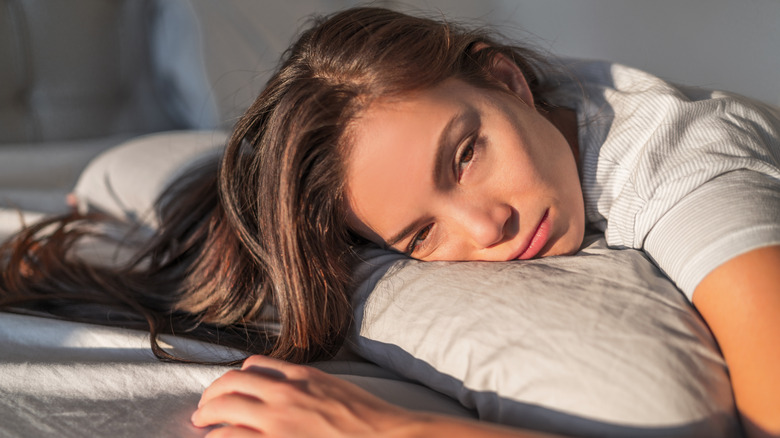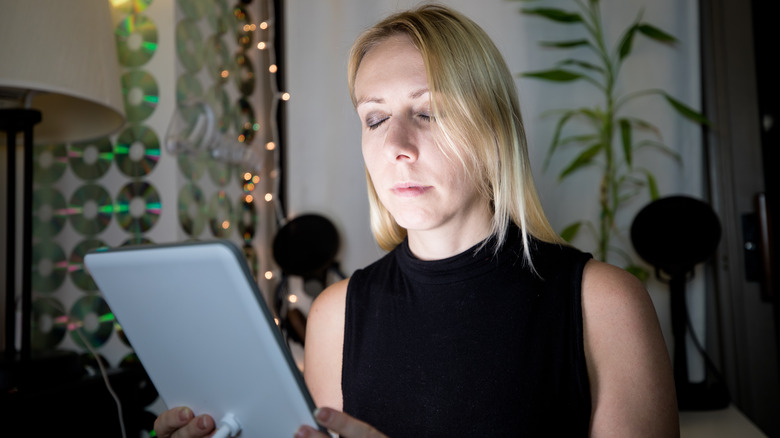Signs You Might Be Dealing With Seasonal Affective Disorder, According To A Clinical Psychologist
We may receive a commission on purchases made from links.
Longing for those 8 p.m. August sunsets and long days at the beach? Seasonal affective disorder, commonly known by the apt acronym SAD, mildly affects nearly 20% of people every winter, with 4-6% of the population experiencing more severe depressive symptoms (via American Family Physician). SAD is determined by the seasons — specifically, daylight exposure. Though some experience ill effects during the summer, winter is most commonly associated with seasonal depression. As the hours of sunlight decrease — particularly in the Northern Hemisphere — it's not uncommon to feel a change in your mood, increased lethargy, and unusual cravings.
According to the University of Utah Health, more women than men experience SAD, a fact perhaps related to fluctuating estrogen levels and its impact on serotonin. The List sat down with Dr. Monica Vermani, clinical psychologist and author of "A Deeper Wellness: Conquering Stress, Mood, Anxiety and Traumas" to discuss the symptoms of seasonal depression.
Dr. Vermani told us that seasonal depressive episodes can last up to five months of the year, from late fall up until the spring or even early summer. Fortunately, you're not alone. Thanks to years of research, we've come a long way in combating depression. With the proper help — and maybe a SAD sun lamp — it's possible to feel like your summer self again; minus those painful sunburns.
SAD symptoms include changes in sleep patterns and diet
Though most are familiar with insomnia — difficulty falling asleep and staying asleep — hypersomnia can present just as many challenges, ultimately creating distance between you and your possible support system. According to clinical psychologist Dr. Monica Vermani, hypersomnia (also known as oversleeping) is a symptom of wintertime SAD, specifically. Those suffering from the disorder might feel sluggish, exhausted, and irritable. Though it's not uncommon to experience changes in sleep when suffering from clinical depression, a lack of daylight during winter months can lead to an increased "desire to hibernate and isolate from others," Dr. Vermani told The List.
Comfort foods, especially those dense in carbohydrates, provide a means of escape for those suffering from wintertime depression. Overeating, poor self-esteem, and trouble focusing all become part of a vicious cycle — a path that can sometimes result in suicidal ideation and thoughts of death, Dr. Vermani explained.
Whereas winter SAD is marked by hypersomnia and a reliance on food as a coping mechanism, summer SAD (although much less common, as noted by Dr. Vermani) often results in insomnia, poor appetite, hyperactivity, and anxiety. Whatever the case, don't underestimate the seasons' ability to alter everything from mood to menu.
Light therapy lamps can help with SAD
Light therapy can be a helpful resource for those suffering from wintertime SAD. According to American Family Physician, some doctors may prescribe a light box or light visor (kind of like a stylish sunlight hat), to help combat the lethargy and low self-esteem associated with SAD. For about half an hour a day, patients are asked to soak up the sun using their light therapy device, continuing the routine until mid-spring when the days get longer and light from the actual sun can alleviate symptoms.
If light therapy doesn't prove useful for you, there are plenty of other healthy ways to combat seasonal depression. For starters, an antidepressant prescription can help increase levels of serotonin (via Mayo Clinic). Keep in mind that SSRIs are not a cure-all treatment. They're often most effective when used in conjunction with talk therapy, sunlight lamps, and practiced coping skills — exercise and social interaction, for instance, are both helpful habits when it comes to shutting down SAD.
If you're feeling especially stuck, scheduling a vacation can also prove useful, per EveryDay Health. Because booking a flight to a sunnier, warmer climate is not always financially inaccessible, consider planning a staycation instead — treat yourself to a local spa day, go on a hike, or even explore a new neighborhood in your home city. A quick break from a busy schedule can have lasting effects. Some also swear by supplements as an over-the-counter solution to seasonal affective disorder.


